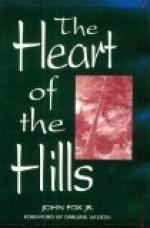“Jason has come back,” she wrote, “to learn some way o’ gittin’ his land back.’”
For the school-master’s reflections during his long drive had not been wholly impersonal. With his own family there had been the same change, the same passing, the workings of the same force in the same remorseless way, and to him, too, the same doom had come. The home to which he was driving had been his, but it was Morton Sanders’s now. His brother lived there as manager of Sanders’s flocks, herds, and acres, and in the house of his fathers the school-master now paid his own brother for his board.
XVI
The boy was curled up on the rear seat of the smoking-car. His face was upturned to the glare of light above him, the train bumped, jerked, and swayed; smoke and dust rolled in at the open window and cinders stung his face, but he slept as peacefully as though he were in one of the huge feather-beds at his grandfather’s house—slept until the conductor shook him by the shoulder, when he opened his eyes, grunted, and closed them again. The train stopped, a brakeman yanked him roughly to his feet, put a cheap suit-case into his hand, and pushed him, still dazed, into the chill morning air. The train rumbled on and left him blinking into a lantern held up to his face, but he did not look promising as a hotel guest and the darky porter turned abruptly; and the boy yawned long and deeply, with his arms stretched above his head, dropped on the frosty bars of a baggage-truck and rose again shivering. Cocks were crowing, light was showing in the east, the sea of mist that he well knew was about him, but no mountains loomed above it, and St. Hilda’s prize pupil, Jason Hawn, woke sharply at last with a tingling that went from head to foot. Once more he was in the land of the Blue-grass, his journey was almost over, and in a few hours he would put his confident feet on a new level and march on upward. Gradually, as the lad paced the platform, the mist thinned and the outlines of things came out. A mysterious dark bulk high in the air showed as a water-tank, roofs new to mountain eyes jutted upward, trees softly emerged, a desolate dusty street opened before him, and the cocks crowed on lustily all around him and from farm-houses far away. The crowing made him hungry, and he went to the light of a little eating-house and asked the price of the things he saw on the counter there, but the price was too high. He shook his head and went out, but his pangs were so keen that he went back for a cup of coffee and a hard-boiled egg, and then he heard the coming thunder of his train. The sun was rising as he sped on through the breaking mist toward the Blue-grass town that in pioneer days was known as the Athens of the West. In a few minutes the train slackened in mid-air and on a cloud of mist between jutting cliffs, it seemed, and the startled lad, looking far down through it, saw a winding




